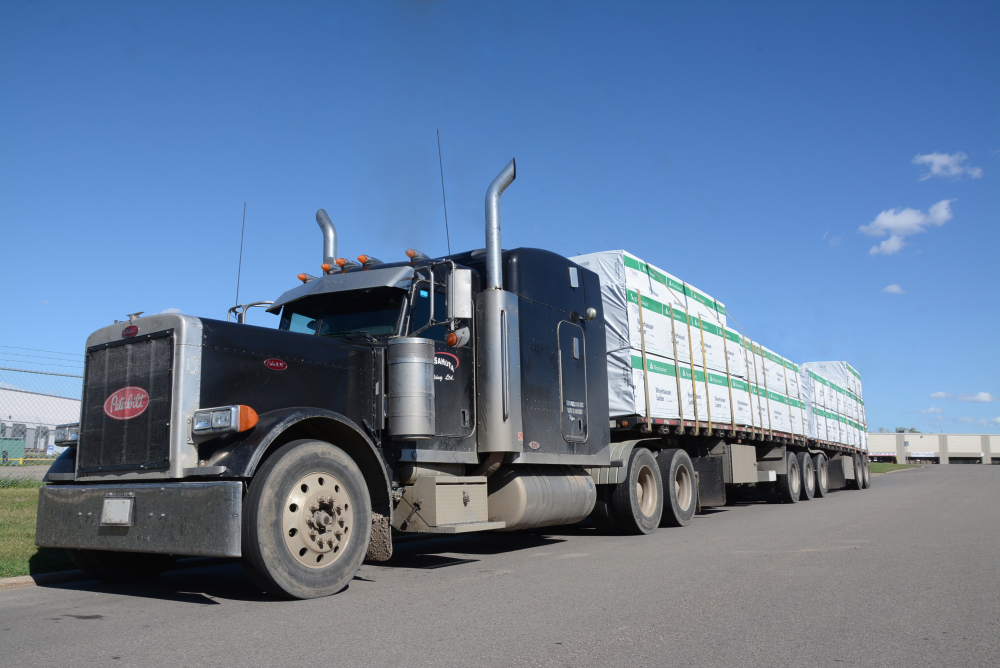VANCOUVER — Heavy-duty vehicles are difficult to decarbonize, and the heaviest of heavy trucks – weighing up to 63,500 kilograms – are especially challenging due to their high energy demands, small business ownership, and typically small profit margins. In How to Lighten the Climate Load, the Pembina Institute assesses the viability of emerging technology and fuel options, and the programs and regulations, that support the decarbonization of the heaviest trucks in British Columbia and the transportation sector more broadly.
Technologies assessed include battery electric trucks, hydrogen fuel cell electric trucks, biofuels (biodiesel and renewable diesel), and natural gas (including renewable natural gas); the performance of each was compared to a diesel baseline. Researchers concluded each presents trade-offs in terms of life cycle GHG emissions, air pollutant emissions, cost, technological maturity, charging/fuelling infrastructure availability, and more.
To further decarbonize heavy-duty vehicles and accelerate clean transportation, researchers identified 16 policy actions including:
- develop a zero-emission vehicle standard for medium- and heavy-duty vehicles
- work with corporate partners to accelerate commercialization pilots and in-fleet demonstrations of near-zero and zero-emission heavy-haul vehicles
- update scope of point-of-sale purchase incentive programs, and explore waiving provincial sales tax for the purchase of near-zero and zero-emission heavy duty vehicles by small- and medium-size businesses, including owner-operators
- develop an interprovincial/territorial working group to co-ordinate the build-out of charging and fuelling infrastructure across popular Canadian freight corridors.
Quotes
“Transportation emissions are almost on par with oil and gas emissions in Canada, with emissions from freight especially difficult to decarbonize. More needs to be done across Canada to get drivers behind the wheel of heavy-duty trucks with near-zero and zero-emission technologies that meet their needs. Government policy will influence the growth, development and adoption of these technologies to lighten this sector’s climate load.”
— Maddy Ewing, senior analyst, transportation and urban solutions, Pembina Institute
“B.C.’s updated climate plan, CleanBC Roadmap, will help put more zero-emission vehicles on the road faster. The government now has the information and policy options to get more ZEV trucks on our roads as emissions from medium- and heavy-duty trucks threaten to overtake emissions from passenger vehicles. This research will help pave the way forward.”
— Karen Tam Wu, B.C. regional director, Pembina Institute
Quick facts
- Transportation is responsible for 25.5 per cent of emissions across Canada, according to the 2021 National Inventory Report.
- Between 2005 and 2019, transportation emissions increased by 16 per cent, with freight increasing at three times the rate of passenger emissions.
- In B.C., transportation contributed to 39 per cent of the province’s total GHG emissions in 2019, with medium- and heavy-duty vehicles responsible for 35 per cent of all transportation emissions despite making up only five per cent of the province’s vehicle registrations.
- Freight emissions in B.C. have increased 29 per cent since 2009.
- Heavy-duty vehicles contribute disproportionately to local air pollutant emissions like nitrogen oxides and black carbon that play a role in the formation of smog and localized air pollution that can be harmful to human health.
[30]
Download a copy of How to Lighten the Climate Load: Technology and policy options to decarbonize B.C.’s heaviest trucks.
Contact
Sarah MacWhirter
Director, Communications, Pembina Institute
416-389-7465
Background
Report: Long-haul trucking fleets take emission reductions into their own hands: Canadian companies adopt practices and devices that lower fuel use and costs
Media statement: B.C. climate plan closes gap on 2030 target, unclear on role of gas
Report: All Hands on Deck: An assessment of provincial, territorial and federal readiness to deliver a safe climate
Report: Building a zero-emission goods-movement system
Report: Fuel savings and emissions reductions in heavy-duty trucking




